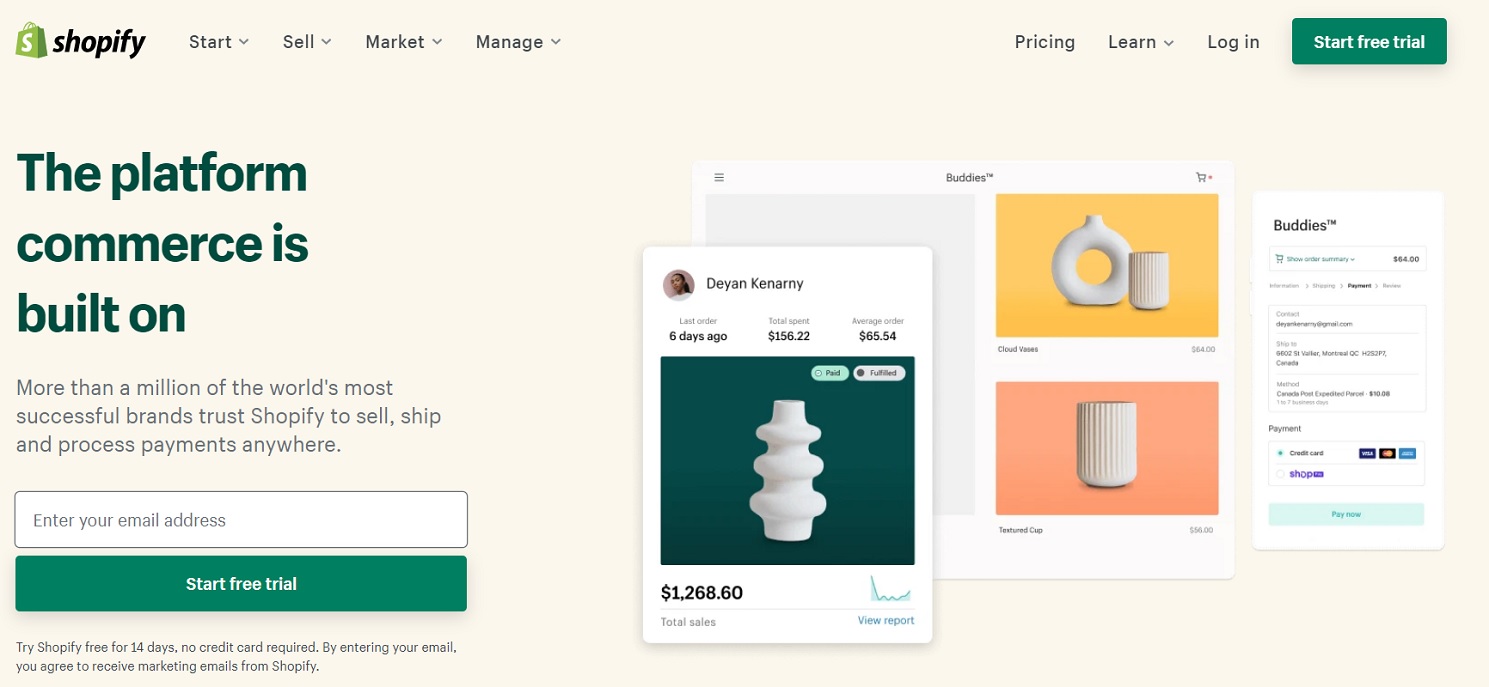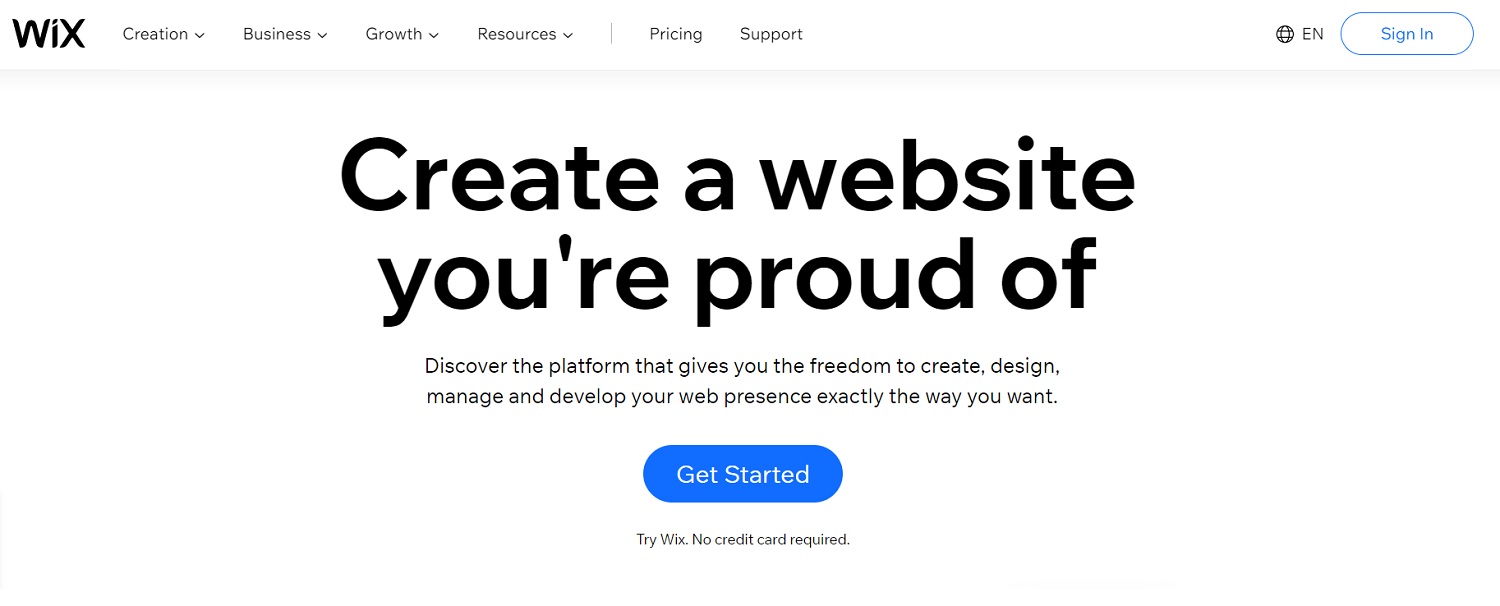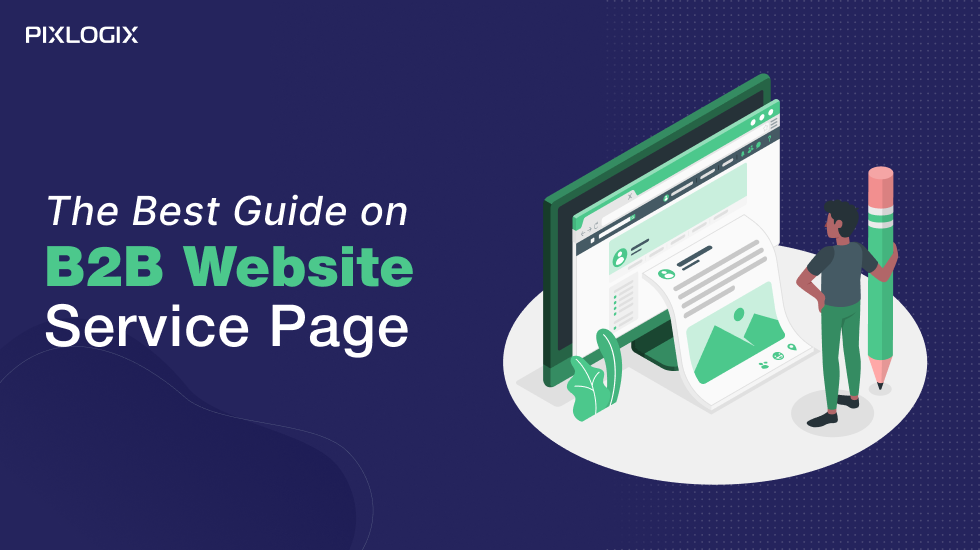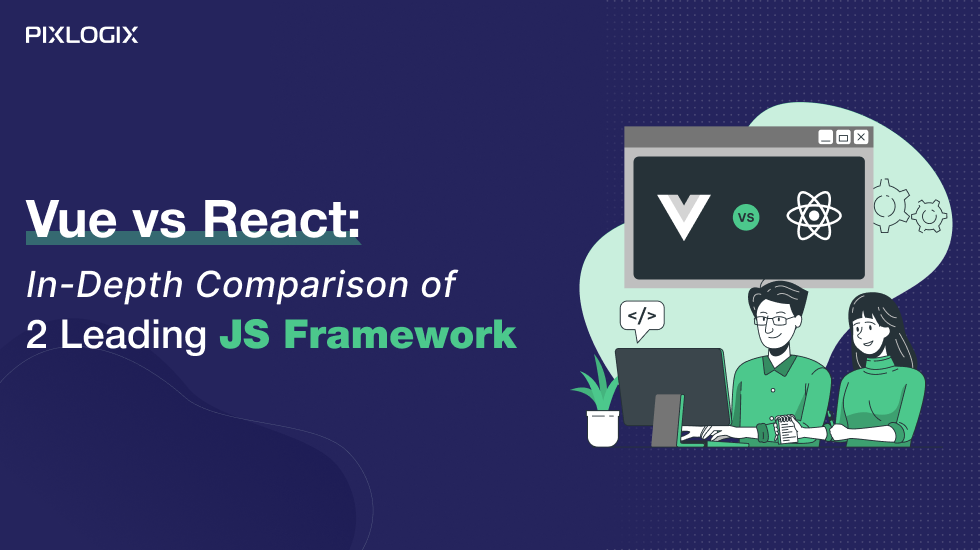16 Recommended List of the Best eCommerce CMS for Online Business
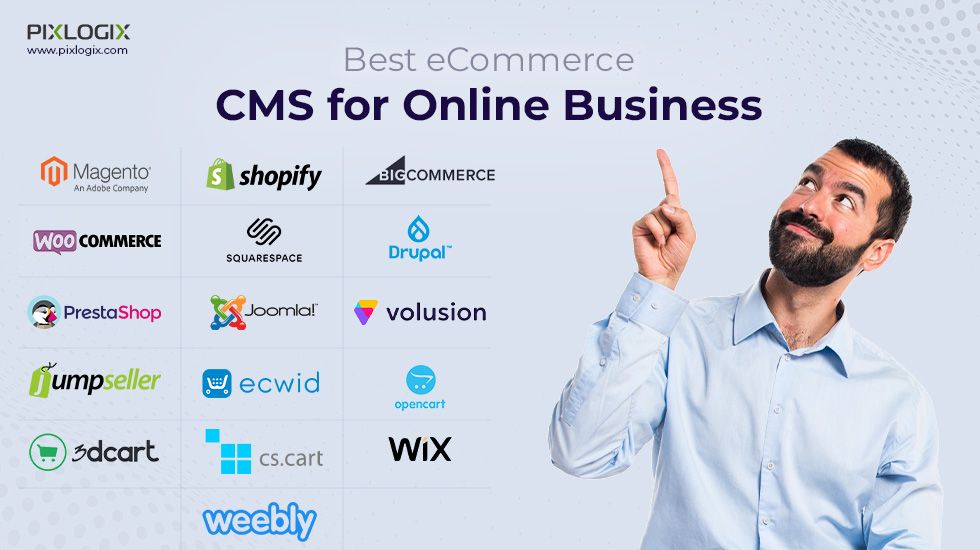
- Last Updated On September 11, 2024
- 23 min read
The CMS manages “public” content while the eCommerce platform needs shopping cart and product information to go public. With operational tools, the eCommerce platform serves a range of compelling features. The abundance of CMS platforms for eCommerce is already available.
But more than offering the benefits, the plethora of platforms makes choosing tedious. You have to search and discover the most popular options that can give you loads of benefits.
So, to assist you, we have created this blog that explains, which is the best ecommerce cms platforms for web development will serve your business better.
List of the Best eCommerce CMS for Online Business
Table of Contents:
- Magento
- Shopify
- BigCommerce
- WooCommerce
- Squarespace
- Drupal
- PrestaShop
- Joomla
- Volusion
- Jumpseller
- Ecwid
- OpenCart
- 3DCart
- CS-Cart
- Wix
- Weebly
65% of online stores are built on open-source platforms, driven by flexibility and cost-effectiveness.
Let’s get some more details about Best eCommerce CMS for Online Business
1. Magento
Best CMS eCommerce has developed a good reputation over the years.
You will appreciate the most that Magento, a robust eCommerce CMS fit for large-scale businesses, isn’t going to compromise on anything.
Magento services that is One is Open Source, which means anyone is free to sign up and make a website without getting charged.
The other option available with Magento web development is Magento Commerce, which serves as paid plan providing all hosting services.
With 250,000 eCommerce websites so far, Magento ensures that it has proved to be the top 1 million eCommerce website.
An eCommerce first platform that helps all types of businesses ranks high. What users love about it is scalability and customization.
Medium to large-scale businesses with large budgets appreciate the capabilities of Magento.
Moreover, you can rest assured about getting easy scalability, full customization & restructuring options with a large community and that’s why magento is a complete solution for e-commerce store business.
List of Pros for Magento ecommerce CMS
- Out-of-the-box features.
- Community edition, and enterprise edition, offers rich features
- Easy to build dynamic and powerful e-store.
- Highly secured e-store.
List of Cons for Magento ecommerce CMS
- Tough to handle for non-technical persons
Pricing: For Magento pricing you need to contact sales.
2. Shopify
You can get a massive range of benefits with the choice of the All in One Commerce Solution Ecommerce Software with the Point Of Sale.
Shopify, the best platform at selling, helps you dropship.
You can rely on Facebook Ads or Instagram marketing when you are relying on Shopify.
Massive success is evident from the data that in 2021, Shopify witnessed a 45.8 percent increase in eCommerce market share.
What makes it better is that Shopify serves better over BigCommerce, especially when it comes to post-purchase 1-click upsells. Fastest Load Time, 1-Click Selling Apps Available, Super Easy Set Up, makes Shopify one of the best choices that you can go for.
What makes Shopify web development even better is that Performance, Ease of Use, Design & Themes, Integrations are incredible.
Beginners to website development will love this platform because of the range of beginner-friendly services it provides.
List of Pros for Shopify ecommerce CMS
- Fast load time
- Easy to set up
- Lots of certified partners who can support you
- Allows multiple channel and social selling
List of Cons for Shopify ecommerce CMS
-
- Shopify is the best ecommerce CMS but not able to customize technical SEO.
Pricing: The Basic Shopify plan will be available at USD 29.00/month. Moreover, the Shopify plan is available at USD 79.00/month and the Advanced Shopify plan at USD 299.00/month.
50% of customers abandon a website if it takes more than 3 seconds to load: Speed and performance are key factors for user satisfaction and conversions. (Source: Google, 2023)
3. BigCommerce
BigCommerce is the one of the best eCommerce CMS Prominent platform, BigCommerce supports 60,000+ merchants and boasts a plethora of built-in features and CMS capabilities.
What turns the BigCommerce platform commanding is that it can boost the progress of swiftly advancing eCommerce businesses.
Moreover, you can rest assured that it is intuitive enough to empower eCommerce beginners. The full spectrum of the eCommerce sector makes it even better.
What an eCommerce web development company appreciates about this platform is the advanced SEO integration and flexible APIs.
That said, merchants connect to leading software and CMS solutions intending to leverage the BigCommerce shopping cart.
BigCommerce serves as the best platform fully hosted, Level 1 PCI compliant, and can serve you on a monthly subscription basis. More than 95,000 merchants have been using this platform.
List of Pros for BigCommerce CMS
- Outstanding management programs, including order management, analytics, reports, product management, and more.
- Great for daily shop management.
List of Cons for BigCommerce CMS
- Multi-faceted and expensive subscription plans.
Pricing: The overall prices range from $29.95 to $299.95 per month.
Read Also: BigCommerce vs Magento
Mobile commerce accounts for 72.9% of all eCommerce sales: Optimizing for mobile devices is crucial for success. (Source: Statista, February 2023)
4. WooCommerce
WooCommerce, an open-source eCommerce platform, serves as a customizable plugin that lets you add to any WordPress site.
What you will like is that? it has to serve in the WooCommerce online shop website builder.
It has the REST API that makes it completely scalable to develop a store. Moreover, you won’t have to face the limitations.
WooCommerce is supportive of the multiple payment methods essential part of any eCommerce website.
About 7.4 percent of all websites rely on WooCommerce. WooCommerce has got the acknowledgment in the form of the eCommerce website platform that facilitates accepting payments with the assistance of the major credit cards, checks, COD, bank transfers, along with the 140 region-specific payment gateways.
The Popular payment gateways that you can incorporate include Stripe, PayPal, Apple Pay, Square, Amazon Pay, and Google Pay. Popular brands using WooCommerce eCommerce website builder include big names like AeroPress, All Blacks, Weber, and more.
WooCommerce serves the best with the powerful community, especially when you are stuck while building an online store.
Overall, WooCommerce has been developing its importance as the Open-source, PCI Compliant platform to serve better.
It also has a section for the Built-in analytics alongside the availability of the 1,300 WooCommerce themes.
List of Pros for WooCommerce CMS
- Real-time shipping rates
- SEO-friendly and mobile-friendly platform
List of Cons for WooCommerce CMS
- Recurring needs of additional plugins installation for advanced features
Pricing: WooCommerce plugin is free but Add-ons starts from $0 to $200.
WooCommerce dominates with a 28.25% market share, powering over 6.5 million active online stores.
5. Squarespace
Squarespace, not an eCommerce first platform, serves as a website builder and blogging platform.
You can use this platform to build online stores. 2021 updates suggest that Squarespace generated $621.15 million in revenue in 2020.
Bundled services used together serve as an all-in-one blogging platform. What you will gain the most is the hosting service, domain registrar, and online store.
Also, it gives the scope to host websites on private.
You can start small with limited products and rest as Squarespace is an ideal choice with cost-effective template designs.
Moreover, it will come in the form of powerful design-building tools.
Besides, it is the best for the merchants or businesses specifically for building attractive stores with creative designs alongside commanding designing tools.
List of Pros for Squarespace ecommerce CMS
- Easy to use platform for the small business owners
- Quick and simple plugins
- easily expand as per your needs
List of Cons for Squarespace ecommerce CMS
- Support is good but need improvement in phone support
Pricing: Four all-inclusive plans cost between $12 and $40 per month. The favorable options are Personal – $12 per month, Business – $18 per month Commerce, and Basic version – $26 per month and advanced commerce $40 per month.
75% of eCommerce sales are expected to occur on mobile devices by 2025.
6. Drupal
Drupal isn’t a platform dedicated to eCommerce specifically, but it is possible to combine it with different plugins and frameworks that can help boost eCommerce functionality.
Extensively utilized open-source CMS, Drupal is as prevalent as WordPress and Joomla.
User-friendly interface, Drupal is the most favorable for the ones with significant development knowledge.
When combined with the BigCommerce plugin, the incredible flexibility it offers ensures that you can get the advantages of the fully customizable front-end and fully hosted backend.
List of Pros for Drupal ecommerce CMS
- Fit for creating large, complex websites
- Open-source code
- Rebuild according to their precise needs without hassles
List of Cons for Drupal ecommerce CMS
- Security concerns inherent to an open-source platform
Pricing: Drupal is FREE to download but many web development company charge as per requirement of customization.
Read Also: WooCommerce vs Shopify
7. PrestaShop
PrestaShop is one of the best eCommerce CMS. Founded in 2005, PrestaShop, aka PHPOpenStore, got its release in two languages- English and French. 2007 updates suggest that PrestaShop SA found establishment by the founders Igor Schlumberger and Bruno Leveque.
PrestaShop has built a great reputation as the open-source self-hosted eCommerce solution worldwide.
In-built features ensure that you don’t have to take the headache to add a lot of extensions.
PrestaShop is also easy to install and set up, though some web development experience is required. This platform is one of the best for merchants who don’t want the management of a lot of extensions and low-cost solutions.
List of Pros for PrestaShop ecommerce CMS
- Free to use at beginner level
- Easy to set up and maintain
- Customized categories, products, and advanced products
- Nice menus and layouts
List of Cons for PrestaShop ecommerce CMS
- A bit complicated in SEO for non technical person.
Pricing: Prestashop is a free but the majority of add-ons come with a minimum price range.
8. Joomla
Joomla, an open-source content management platform, offers users the support to build websites and publish content online.
However, it’s worth noting that its core functionality isn’t eCommerce.
But, you can get the availability of the number of free extensions to turn a Joomla site into an eCommerce store.
List of Pros for Joomla ecommerce CMS
- Improved open-source software
- Easy to install
- Creating unique customization using add-ons and themes
- Dynamic and flexible CMS
List of Cons for Joomla ecommerce CMS
- Minimal customer support available
Pricing: Joomla is open source and it’s available on FREE. You can also get the range of the added various add-ons with these CMS systems at additional prices.
Shopify scores highest in overall customer satisfaction (95%), followed by BigCommerce (91%) and Wix eCommerce (89%).
9. Volusion
Volusion, a cloud-based solution, is quite similar to Shopify, where you can’t use private servers to host a website.
The plug-and-play platform, Volusion lets you set up an account, add products, and then take into consideration the functionalities.
13 free themes and templates make it a better place than another platform.
The platform boasts 180000 users and $28 billion in total sales, making it one of the leading eCommerce platforms. Volusion, a low-cost solution, offers all the basic features of eCommerce CMS. Add plugins and apps.
However, the only issue is that the number is limited compared to direct competitors BigCommerce and Shopify.
If you want several functionalities, it serves as one of the most recommended platforms for small businesses, alongside giving the scope for selling limited products.
- List of Pros for Volusion ecommerce CMS
- Amazing help and support
- Lots of inbuilt features
- Good choice for eCommerce
- List of Cons for Volusion ecommerce CMS
- Dashboard is good but it should be more user friendly.
- Pricing: $29/month Personal Plan supports $50,000 online sales every year. In addition to that, you can get a $79/month professional plan that serves with an annual online sales limit of $100,000.
10. Jumpseller
Jumpseller, an eCommerce platform, serves as one of the best platforms that are worth trying. What you will appreciate are the elegant design and intuitive interface.
Cloud-based solutions allow the creation of online stores and sell products. Jumpseller with a wide range of free and paid themes can give the added convenience.
This platform Features the ease of receiving shipping rates from UPS, USPS, etc.
Moreover, you can get the convenience of creating automatic digital invoices. Be ready to add live chat support to the online shopping websites.
Moreover, you can also imprint signature and vision on an online store with customization options. Be ready to promote products on social media channels like Facebook via apps.
List of Pros for Jumpseller ecommerce CMS
- Beginner-friendly design
- Learning curve available for every CMS
- Crystal-clear block-based design system
List of Cons for Jumpseller ecommerce CMS
- Not a lot of customization options are available
Pricing: The pricing scheme of the platform falls under the three categories. Plus, plans are available at $21/month. In addition to that, the Pro plan is available at $42/month and Premium $84/month.
Read Also: Magento vs Shopify vs WooCommerce
11. Ecwid
Ecwid, an eCommerce CMS platform, ensures giving the opportunity to create bold online stores to sell products.
eCommerce technologies available with the platform make it easier to build websites easily and modify online stores.
It also gives the scope for Monitoring the status of products selling both online and offline.
List of Pros for Ecwid ecommerce CMS
- Customizable CSS design schemes
- Plenty of promotional discount coupons, gifts, available
List of Cons for Ecwid ecommerce CMS
- Complicated to handle configuration and settings
Pricing: The pricing plans are very appropriate. You can get the Venture, Business, Unlimited plans available. You can choose with FREE plan to unlimited plans as per your needs.
Read Also: Magento vs WooCommerce
12. OpenCart
The open-source content management system, OpenCart, is very favorable for eCommerce. What makes it fine is that it serves as a free and multifunctional solution.
With it, you can get a bunch of templates for quick setup.
Moreover, it also comes with a thriving plugin marketplace. Twenty payment gateways alongside the availability of the eight shipping methods make it the best.
BuiltWith statistics suggest that OpenCart is possessing a 3 percent market share while also giving support to 390,000 eCommerce sites.
List of Pros for OpenCart ecommerce CMS
- MVC module is easy to learn
- Change features and build modules according to the preferences of users
- Plenty of modules available
List of Cons for OpenCart ecommerce CMS
- File limitations is a serious issue
Pricing: FREE, open-source and easy to use ecommerce platform!
Read Also: OpenCart vs WooCommerce
13. 3DCart
3DCart, aka Shift4shop, serves as one of the best platforms that develop eCommerce software for business. The foundation of this eCommerce CMS had been in 1997.
The headquarters of 3DCart is situated in Tamarac, FL. The platform 3DCart is aimed at the development of business opportunities for retailers and manufacturer.
The most popular CMS for eCommerce platform has got a good reputation over the years because it is trusted by thousands of leading eCommerce businesses, including some of the big names in the industry like The UPS Store, CAA, Hickory farms.
Till now, 3DCart has been a helpful platform with serving over 200,000 customers across the globe. One of the best parts of 3DCart is that it got rebranded as Shift4shop.
However, this 2021 update suggests that the Shift4shop is not for startups. One of the advanced features that you will appreciate is that the platform 3DCart supports all required integrations.
Moreover, it is also the best for the reason that it offers user management tools.
List of Pros for 3DCart ecommerce CMS
- Plenty of in-built features in the core
- No transaction fees
- Unlimited storage
List of Cons for 3DCart ecommerce CMS
- Industrial and outdated templates
Pricing: 3Dcart pricing is available at the NANO plan at $9.99/month, MINI at $19.99/month. Moreover, the other plans are available at STARTER plan at $35.99/month.
Professional plan is available at $65.99/month. Moreover, it is favorable for Professional Plus plans at $99.99/month.
Read Also: WordPress vs Squarespace
14. CS-Cart
CS-Cart is flexible, powerful, and full-featured eCommerce software. CS-Cart allows building an online store that can match businesses of any size and type.
CS-Cart can ensure providing multi-store support set up and maintained, thus leading to the development of a single administration panel.
It is the platform that can help receive automatic shipping rates with support from USPS and FedEx.
It can also develop a single-page checkout process that can assist the customers. Besides, it can also assist with setting up taxes based on the customer’s location.
Be ready to get the online store into any webpage that can help with inserting a widget code.
The platform is also supportive that can enable customers to post testimonials, reviews, and comments in the online stores.
List of Pros for CS-Cart ecommerce CMS
- Easy to install themes
- Thousands of themes design to suit the CS-CART site
- Multi-vendor supports with complete eCommerce functionalities
- Easy-to-use admin panels
- Regular updates and security
List of Cons for CS-Cart ecommerce CMS
- Software for mobile applications isn’t ideal
Pricing: CS-Cart comes with the multi-vendor support that comes with the $1,450 with no recurring fee. Moreover, you can also get the support for the multi-vendor plus available at $3,500 with no recurring fee. It even healthier is that it comes with the multi-vendor ultimate plan available at $7,500 with no recurring fee.
Read Also: Magento vs WordPress
15. Wix
Wix, a leading drag-and-drop website building platform, is the most suitable for online business.
However, it is worth noting that Wix is not technically an eCommerce CMS yet the website owners have scope to add the commerce module.
You can get the availability of a variety of templates, built-in features alongside the no-code approach. You can rest assured that a platform is an appealing option for complete beginners and non-coders.
When you have a limited range of products and are looking forward to getting your business to the next level, you must look forward to getting support from Wix.
One of the best platforms in the eCommerce space, Wix delivers amazing value for solopreneurs as well as small eCommerce businesses. What you will rate the utmost is that it comes with a range of eCommerce features evolving every day.
That said, you can rest assured about getting the multi-channel integration, dropship, and print-on-demand capabilities alongside the abandoned cart recovery.
It will also assist you when you need to deal with heavy digital products.Beginner-friendly interface Wix serves in the form of one of the top website builders. You will certainly appreciate the on-page customer support.
There is also a chance for utilization of the drag and drop elements to add functionality, cool videos, and create a website. This is one of the best platforms where you can get the availability of over 500 themes, and you can get the extra support as out of the 72 are free.
List of Pros for Wix ecommerce CMS
- Availability of the free amazing themes.
- Simple to use and set up
- 72 free themes according to the latest updates
List of Cons for Wix ecommerce CMS
- Lacks upselling features
Pricing: Pricing plans start at $14 per month, which can also be applicable to the Combo plan when billed annually. An unlimited offer costs $18 per month and is favorable for the larger sites. Wix VIP plans are also available at $39 per month. You can enjoy the cheapest eCommerce plan in the form of the Business Basic at $23 per month.
Read Also: HubSpot CMS vs WordPress
16. Weebly
Weebly, a great option founded in 2006, comes with about 40 million customers, which will be the most suitable for the people looking for a simple store with a plethora of marketing automation.
Also, there is a solid focus on eCommerce, with advanced sophistication. Overall, this platform serves as an excellent choice for startup entrepreneurs who do not want to go with the extra expenditures for hiring a developer.
Their website states that over 30,000,000 people worldwide trust the plans by Weebly. The starter plan lacks features like coupons, custom shopping carts, and inventory management, so there is a need for taking the assistance of the other plans.
Drag and drop editing tool alongside the options for using HTML and CSS to customize template makes it stand out. The plans here are also conveniently priced, which makes them favorable for use. Easy to use platform, Weebly offers tools for a functional store.
List of Pros for Weebly ecommerce CMS
- Excellent value platform
- Lowest price for marketing automation
- Low cost and free designs
- Simple dashboard
List of Cons for Weebly ecommerce CMS
- Inappropriate SEO
Pricing: Joining Weebly will cost $38 per month compared to using the Shopify and Active Campaign available at $29 + $17.
Key Takeaways About Best eCommerce CMS for Online Business
You have now got the list of the best eCommerce platforms worth trying and can be assured to expand your products and brand. Though there are numerous CMS platforms available worldwide, yet we have listed only the ones that have built a reputation and have been offering promising plans worth trying. So, consider the metrics concerning your business and go ahead with the one that will be suitable for your needs. You can connect with us for better infromation e-ommerce website development and if you have any suggestion- you can share with us!
Samir Bhimbha
Samir Bhimbha is the Founder & CEO of Pixlogix Infotech Pvt. Ltd. which offers web and app solutions to fulfill business's online needs and help to improve their online presence with many clients in the USA, Europe, Australia, and more. He is a skilled entrepreneur, web designer, developer, and team leader who can handle every situation. With 15+ years of experience in UX/UI design and web development, he is leading a team of IT professional talents.
Related Post
Get in Touch Now!
Have a word with our expert consultants about your next project to get suggestive guidance & proposal.
Sales Inquiry
Chat with us about your project for a custom solution and quote.


